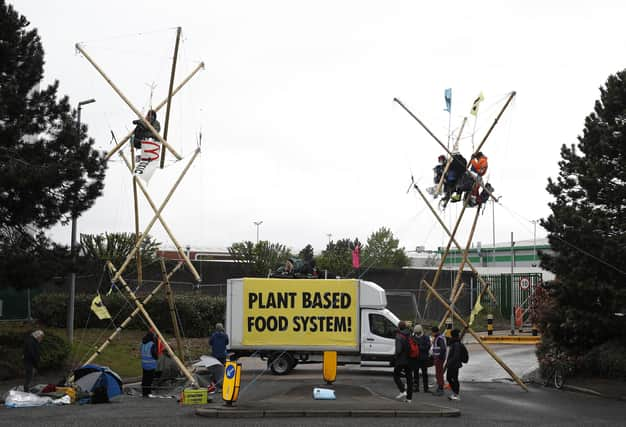Animal Rebellion protesters campaigning for a 'plant-based future' should rethink their self-indulgent, attention-seeking tactics – Stephen Jardine


I’m not talking about giving just three stars on TripAdvisor to the café where the fresh scones were baked yesterday. I mean taking to the streets and getting uncomfortable to draw attention to a cause.
For most people, the answer is likely to be a long time ago. In this age of social media, we are more likely to post a pithy comment than make a placard. Here in Scotland, the All Under One Banner protests are the only recent mass mobilisation of popular protest.
Advertisement
Hide AdAdvertisement
Hide AdHow times have changed. A few decades ago, you could barely drive down a road without coming meeting an angry demonstration. As a trainee journalist, I vaguely remember taking part in a march through Glasgow about the Zircon spy satellite controversy. At the time, it seemed like the most important injustice ever but today I would struggle to remember the basic details.
Around that time, everyone seemed to be marching to ban the bomb, save the whale or free Nelson Mandela. Some worked better than others but street demonstrations were an important way of pushing issues to the top of the agenda. Often they became the top story on the nightly news.
That presumably was the aim of Animal Rebellion activists who marched into Harrods Food Hall and emptied milk cartons all over the floor to protest against the dairy industry.
One of those taking part, Beau King Houston, said: “We took this action in Harrods to show that we won't stand by as unsustainable, destructive industries wreak havoc on lives across the globe.”
Beau’s actions did not make the news headlines but it was shared widely on social media. Unfortunately, it didn’t get the reaction he might have hoped for.
From pointing out the obscenity of the waste in a cost-of-living crisis to underlining the fact that a low-paid worker would have to clean up the mess, the direct action was widely lambasted as the worst sort of privileged, self-indulgent, performative protest.
It’s one thing to protest outside a supermarket or cheese shop and directly lobby shoppers about what goes on inside the dairy industry but stunts like the one in Harrods smack of the sort of desperate desire for attention that you see every day on social media platforms like TikTok.
It may go down well with those already converted but for the mass of the tea-loving population who don’t think beyond a lot or a little when it comes to milk, it simply alienates and irritates. And that is what Beau and his urban cookie collective are missing.
Advertisement
Hide AdAdvertisement
Hide AdThe street demonstrations of the past were specifically designed to attract people to the cause. With clearly articulated aims that seemed to make sense to most people, the aim was to create a consensus in society that politicians couldn’t ignore.
Next month Animal Rebellion are promising more direct action “to show a plant-based future is possible”. We have a proud history of protest in this country and they are quite entitled to follow their conscience as part of that.
But when your actions attract more derision than support, it might be time to rethink tactics and concentrate less on pleasing acolytes on social media and more on winning popular support in the real world.
Comments
Want to join the conversation? Please or to comment on this article.
